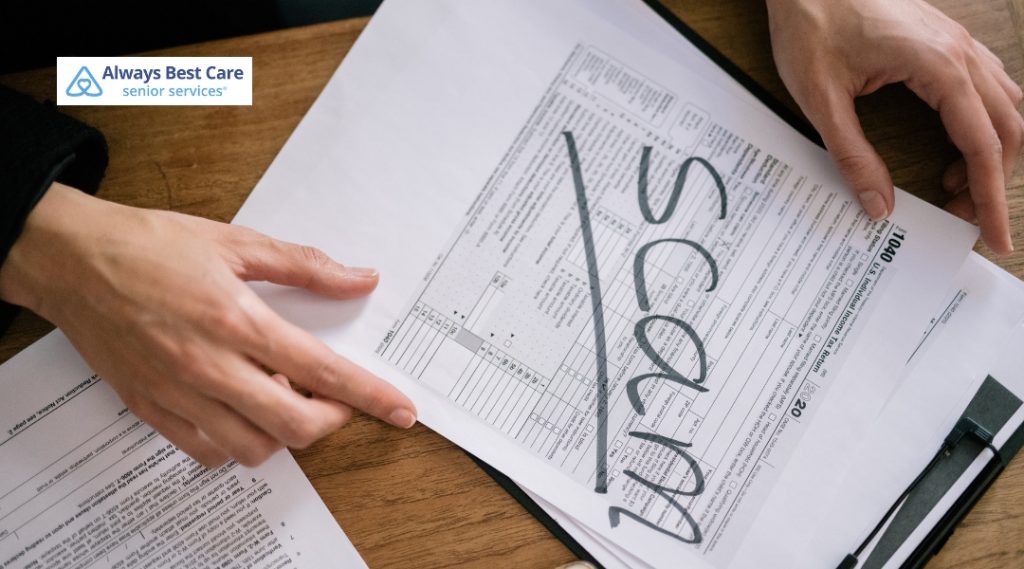Keep Scammers at Bay: A Senior’s Guide to Safety in Houston Metro, TX

Seniors in Houston Metro, TX, are often seen as prime targets for scammers. Whether it’s through phone calls, emails, or even social media, fraudsters have become more creative in their attempts to deceive. But here’s the good news:
You don’t have to fall victim to these tricks.
With the right knowledge and awareness, seniors can stay safe and enjoy their golden years without the stress of fraud hanging over them.
Let’s take a look at how to spot scams, avoid falling for them, and keep your finances—and peace of mind—safe.
Table of Contents
Why Seniors are Common Targets for Scammers
Seniors often have a steady income, whether it’s through Social Security, pensions, or savings, making them appealing targets.
On top of that, seniors are typically more trusting, which is a quality that scammers exploit. Many aren’t as familiar with new technology, which opens the door to digital fraud.

4 Common Scams Targeting Seniors in Houston
- IRS Impersonation Scams: Scammers pretending to be from the IRS will often call or email, claiming you owe back taxes. They’ll demand immediate payment and threaten arrest or legal action if you don’t comply. The IRS will never contact you like this, so if you get a call like this, just hang up.
- Tech Support Scams: Imagine receiving a pop-up on your computer claiming it has a virus and that you need to contact “tech support” to fix it. These scammers will ask for remote access to your computer or request a payment for “services.” Don’t take the bait—real tech companies don’t contact you like this out of the blue.
- Romance Scams: Seniors looking for companionship are often targeted by scammers who create fake relationships online. After gaining trust, these scammers will invent an emergency and ask for money. It’s heartbreaking, but it’s a scam you can avoid by being cautious when connecting with people online.
- Lottery or Prize Scams: “Congratulations! You’ve won a big prize!” We all love the idea of winning something great, but if you didn’t enter a contest, it’s probably a scam. Scammers will often ask for a fee to claim your prize, but legitimate prizes never ask for money upfront.
4 Ways to Spot the Red Flags of a Scam
- Unsolicited Contact: If you didn’t contact someone or enter a contest, that email or phone call might be a scam. Whether it’s an email about a “prize” or a phone call claiming to be from your bank, unsolicited contact is often a red flag.
- Pressure Tactics: Scammers love to rush you into a decision. If someone is pressuring you to act quickly, it’s time to take a step back. They’ll often say, “You have to do this now!” However, there’s always time to verify and think things through.
- Requests for Personal Information: Legitimate companies will never ask for personal information like your Social Security number or bank account details over the phone or email. If someone asks for this info out of the blue, it’s almost certainly a scam.
- Too Good to Be True Offers: If an offer seems too good to be true, it probably is. Scammers often make impossible promises, like winning a large sum of money or being given exclusive deals. Always be skeptical of offers that seem like a dream come true—especially when they require you to pay upfront.

4 Practical Steps for Protecting Yourself from Scams
- Secure Personal Information: Never share your Social Security number, bank account info, or credit card details unless you’re absolutely sure of the source. If you ever feel unsure, ask a family member or trusted friend for advice before making any decisions.
- Use Technology Wisely: Tech can be a great help in protecting yourself. Make sure you have up-to-date antivirus software, and use call-blocking apps to screen scam phone calls. Be cautious about the emails you open, especially if they’re from unknown senders.
- Verify Before You Act: If something seems suspicious, take your time and verify it. Call the organization directly using a verified number—don’t use the contact information provided in the message you received. If it’s a scam, they won’t be able to provide you with solid proof of legitimacy.
- Talk to Someone You Trust: If you receive an unsolicited offer or phone call that feels fishy, talk to someone you trust. A second opinion can help you spot a scam before it becomes a problem.
What to Do if You Think You’ve Been Scammed
- Step 1: Stop Communication with the Scammer: The first step is to stop all communication with the scammer. Do not respond to emails, calls, or texts. Cutting them off prevents them from continuing to manipulate you.
- Step 2: Contact Your Bank: If you’ve shared financial details, call your bank or credit card company immediately. They can freeze your accounts and help you take steps to prevent further damage.
- Step 3: Report the Scam: Report the incident to local authorities, the Federal Trade Commission (FTC), or the Better Business Bureau (BBB). The more scams that are reported, the better the chances of catching the fraudsters and preventing future scams.

FAQ: Protecting Yourself From Scams in Houston Metro
What should I do if I think I’ve been scammed?
Stop all communication with the scammer, contact your bank to freeze accounts, and report the incident to the FTC and local authorities.
How can I tell if a phone call is a scam?
If the caller is pressuring you to make immediate decisions, asking for personal information, or offering something that seems too good to be true, it’s likely a scam.
How can I protect my aging parent from scams?
Help them set up call-blocking services, educate them about common scams, and encourage them to talk to you if they receive unsolicited offers.
Stay Safe and Scam-Free in Houston Metro
Scams are on the rise, but with the right knowledge and proactive steps, seniors in Houston can protect themselves. By being aware of the warning signs, securing personal information, and seeking help when needed, you can avoid falling victim to fraud.
Contact Always Best Care of Houston Metro at (713) 485-5000 to learn more and schedule your free consultation. Stay informed, stay alert, and stay safe.





